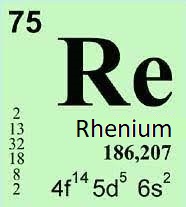Rhenium is a chemical element with atomic number 75 and symbol Re. It belongs to the transition metals and is in the 7th group of the periodic system of elements.
Physical Properties Rhenium
The physical properties of rhenium
- Atomic Mass: The atomic mass of Re is approximately 186.207 g/mol.
- Melting and Boiling Points: Re has an extremely high melting point of about 3186°C (5767°F) and a boiling point of approximately 5627°C (10161°F). This makes it one of the metals with the highest melting and boiling points.
- Density: The density of rhenium is about 21.02 g/cm³, making it one of the densest elements.
- Physical State: Re is a solid metal under normal conditions.
- Magnetic Properties: Re is not a magnetic metal under standard condition
- Color: Re has a silvery-white metallic color and a shiny appearance.
- Mechanical Properties: Re is known for its high mechanical strength and hardness.
- Conductivity: Re exhibits good electrical and thermal conductivity, making it useful in certain electronic components and industrial applications.
- Radioactivity: While the most stable isotope of rhenium (Rhenium-185) is not radioactive, some other isotopes of rhenium are radioactive.
- Thermal Expansion: Re has a low coefficient of thermal expansion, making it a useful material for some technical applications.
Chemical Properties Rhenium
The chemical properties of rhenium include the following aspects:
- Reaction with Acids: Re reacts with dilute acids, such as sulfuric acid (H2SO4) and hydrochloric acid (HCl), to form rhenium compounds. However, it is resistant to concentrated acids and many alkaline solutions.
- Reaction with Chlorine: When heated, rhenium reacts with chlorine (Cl2) at high temperatures, forming rhenium chloride (ReCl5) or (ReCl3).
- Reaction with Other Elements: Re can form compounds with elements such as lead, tantalum, molybdenum, and others.
- Catalytic Activity: Re exhibits catalytic activity in some chemical reactions, such as the hydrogenation of olefins, amines, and other organic compounds.
- Corrosion Resistance: Re has good corrosion resistance, allowing its use in environments where other materials may corrode.
- Melting and Boiling: Re has very high melting (around 3186°C) and boiling (around 5627°C) temperatures. Radioactive Isotopes: Re has several radioactive isotopes that are important for nuclear research and applications.
Applications
Rhenium finds applications in various fields of science, industry, and technology due to its unique chemical and physical properties.
Key applications of rhenium include:
- Turbine Blades: Re is used in the production of turbine blades for jet engines where high resistance to thermal and mechanical stresses at high temperatures is required.
- Catalysts: Re is employed as a catalyst in certain industrial processes such as the hydrogenation of olefins, amines, and other chemical reactions.
- Electronics: Re is used in the manufacture of electrodes for certain electronic devices and components, particularly in sources of infrared radiation.
- Special Alloys: Re is added to special alloys to enhance their mechanical properties, thermal stability, and wear resistance. These alloys are used in catalysts, heating elements, aircraft parts, and many other components.
- Nuclear Industry: Re is used in nuclear research and technologies, including the production of some components for nuclear reactors.
- Instrumentation: Rhenium-based alloys are used in precision measurement instruments.
- Consumer Electronics: Re is used in some consumer electronic devices such as watches, mobile phones, and laptops in miniature components.
- Space Industry: Due to its high-temperature resistance, rhenium is utilized in certain components of spacecraft.
- High-Temperature Components: Re is used in the production of components that operate at very high temperatures, such as turbine blades, turbine vanes, and components of rocket engines.
Overall, rhenium plays a crucial role in various high-tech industrial and scientific applications where specific properties and resistance to high temperatures are required.
